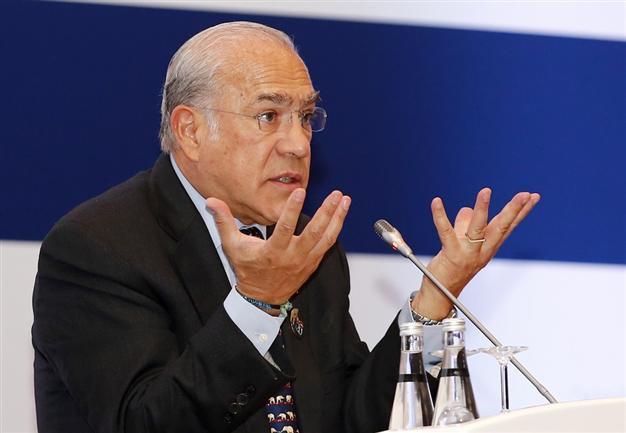OECD chief notes need for Turkish structural reforms
ISTANBUL - Anadolu Agency

AA Photo
Structural reforms in Turkey are essential if the country wishes to stimulate the economy, according to the secretary-general of the Organization for Economic Co-operation and Development (OECD).“Turkey has good fundamentals, but has been hurt by slow global growth. Structural reforms will enable Turkey to make the changes needed to adapt to new conditions. Turkey should use its access to Europe and improve its ability to compete in its largest export market,” Jose Angel Gurria told Anadolu Agency on the sidelines of the G-20 meeting in Istanbul on Oct. 5.
Gurria also voiced concern over the state of global investment. “Something is very wrong with global investment; it is not working the way it should. Taking a global view, we need clearer, simpler and consistent rules to make global investment work again.”
The problem is that investors do not feel safe as rules vary so dramatically from one country to another, he said.
“It’s a spaghetti bowl,” Gurria said. “Regulations are made locally with a view to making investors safe on an ad hoc basis, depending on the time they are made, local conditions and the like. The result is that we are identifying more and more restrictions around the world on investment.”
The organization has proposed a system of best-practice rules for investment called the “Base Erosion and Profit System,” a technical term which refers to a breakdown of ideal legal and regulatory concepts for fair-trade practice and investor protection.
“What is the best investment regime, what is the most favorable investment climate to incite large banks and institutional investors to take action?” he said.
“This should help erode protectionism, which we have as a legacy of the financial crisis. Instead of protection, we should work for the welfare of all individuals, not that of local companies, local workers, local banks,” he said.
For emerging markets, this would be a guide for structural reforms, Gurria said. “We identify the changes that need to be addressed to increase investment, looking in a holistic way at the reform package that a country has to have,” he said.
Countries cannot protect jobs, Gurria pointed out. “The result is only to shut out young people seeking to enter the labor market, and ultimately, that hinders growth. Instead, governments need to look at what goes wrong, and change it based on best practice. We offer a model that can be held up for comparison,” he said.
All emerging markets will gain by adapting the best-practice rules outlined in the Base Erosion and Profit System initiative, Gurria said.
Earlier, speaking at the G-20 meeting on global investment in Istanbul, Gurria said there were 3,000 bilateral trade agreements globally and that the resultant conflict and contradictions were hindering global trade and global investment.
He warned that local regulations conflicting with global rules were keeping investors away. “For example, it is one thing to enact regulation to include more local content in technology. But the local content may not be standard, and so investors stay away,” he said.
Overall, the OECD regulatory restrictiveness index had shown too little improvement, Gurria said.
Gurria called for a hard look at regulation across the world so that investment would begin to flow again freely.
















